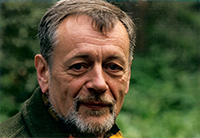Biography C.O. Jellema

C.O. Jellema (1936-2003) studied theology and German language and literature and taught German literature at Groningen University. He was a well-respected poet: his work has been translated into English, German and French. Jellema participated in Poetry International, was a member of literary juries and committees and reviewed literature for several newspapers for many years. He was also an essayist and a translator.
In this research project there are two main angles: the struggle to maintain literary autonomy and the role of homosexuality in the construction of Jellema’s personal and poetic identity.
The autonomy issue will be explored using a set of cohering questions. For example, how did Jellama achieve his hard-won literary recognition? Jellema’s work and poetic principles showed little, if any, resemblance to the views of the then-dominant poets and critics. That is why it is interesting to explore the development of his literary work and his views on literature. His interest in the work of the German mystics, which he also translated, is of special importance in this matter. As early as in his 1961 debut a religious theme can be observed in Jellema’s work. What did this thematic interest signify during a time in which it was unusual to address religious and metaphysical issues?
In the second half of the Twentieth century homosexuality underwent an important transformation, from a taboo subject to being socially accepted. Important questions are: how did Jellema’s acceptance of his own homosexuality develop? In what way did his encounter with a German soldier as a six-year-old, an early initiation into homo-eroticism, influence his life and work? To what extent is the eroticism in his work homo-erotic? How do these things all relate to the characteristics of the lives and works of other authors from this period, during which homosexuality and homosexual emancipation received a lot of attention.
For Jellema writing was a quest for identity, an affirmation of self-worth. Key factors in this are the one-and-a-half-year period during which he underwent tuberculosis treatment as a young boy, his struggle with his homosexuality, being raised with a strong class-consciousness, and his aborted theology studies. The chosen research method makes it possible to explore these and other factors and expand their implications beyond the particular, creating insight into the literary and socio-cultural climate in which Jellema worked.
Supervisors of this project are Prof. G.J. Dorleijn and Prof. J.W. Renders.
An interview with Wynia appeared in the Ommelander Courant. A review of Aan rozen denk ik in de winter. C.O. Jellema (1936-2003) appeared in the following periodicals:
E-mail: gerbenwynia@gmail.com
| Last modified: | 13 October 2023 10.52 a.m. |
